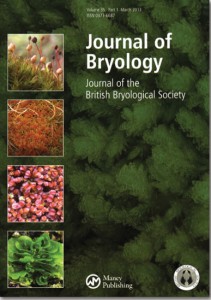- About Ramapo
- Academics
- Admissions & Aid
- Student Life
- Athletics
- Alumni
- Arts & Community
- Quick Links
- Apply
- Visit
- Give
“Three species” Hybrid Peat Moss Widespread in the Holantarctic
(PDF) (DOC) (JPG)September 24, 2013

Study led by Ramapo College Professor Eric Karlin
(MAHWAH, NJ) – Genetic studies have shown that a hybrid peat moss (Sphagnum ×falcatulum) having genomes from three different species to be widespread in the Holantarctic floristic region. Populations of this “three species” hybrid are documented for the southern tip of South America, New Zealand, Tasmania, and Macquarie Island according to a study published in the Journal of Bryology. The research team was headed by Ramapo College Professor Eric Karlin.
The finding is significant because it shows that this peat moss likely evolved in New Zealand, with subsequent long distance dispersal leading to the relatively recent establishment of many isolated populations across the Holantarctic. Because S. ×falcatulum has an extremely variable morphology, genetic study was required to establish the range of morphological variation in the species and also to determine its geographical distribution. “Some forms of the plant have even been described as different species,” said Professor Karlin. Indeed, one major outcome of the study was that seven Sphagnum species were found to be synonymous with S. ×falcatulum.
Another outcome was that, although it is a young species, S.×falcatulum was found to be the most widespread peat moss in the Holantarctic floristic region, with populations on both sides of the Pacific Ocean. Although a genetic oddity, the plant is ecologically successful and clearly has the capacity for effective long distance dispersal.
A prior study by Professor Karlin and his colleagues had established that S.×falcatulum and another Sphagnum species (S.×australe) were both “three species” hybrids, the first to be reported for mosses and other bryophytes (liverworts and hornworts).
Hybrids are usually highly infertile and/or sterile. However, hybrids may become fertile if their chromosomes double (resulting in a condition called allopolyploidy). Thus the evolution of fertile “three species” hybrids is associated with two separate hybridization events, each being followed by chromosome doubling. Perhaps the best known “three species” hybrid is bread wheat (Triticum aestivum), a flowering plant whose origin is believed to have been within the last 10,000 years.
The research team also included colleagues at the New York Botanic Garden (Dr. Bill Buck) in Bronx, New York, USA, the Australian Antarctic Division (Dr. Rod Seppelt) in Kingston, Tasmania, and Duke University (Sandra Boles, Professor Jonathan Shaw) in Durham, North Carolina, USA. Genetic lab work was done at the Duke University Bryology Lab directed by Professor Jonathan Shaw.
The study is available at: http://www.ingentaconnect.com/content/maney/jbr/2013/00000035/00000003/art00001
For more information, please contact Professor Karlin at 201.684.7743 or via email at ekarlin@ramapo.edu. For more information about the Journal of Bryology, please visit http://maneypublishing.com/index.php/journals/jbr/
Journal Reference: Eric F. Karlin, William R. Buck, Rodney D. Seppelt, Sandra B. Boles, & A. Jonathan Shaw. 2013. The double allopolyploid Sphagnum ×falcatulum (Sphagnaceae) in Tierra del Fuego, a Holantarctic perspective. Journal of Bryology 35 (3): 157–172.
###
About Ramapo College
Ramapo College of New Jersey is the state’s premier public liberal arts college and is committed to academic excellence through interdisciplinary and experiential learning, and international and intercultural understanding. The comprehensive college is situated among the beautiful Ramapo Mountains, is within commuting distance to New York City, was named one of the 50 Most Beautiful College Campuses in America by CondeNast Traveler, and boasts the best on-campus housing in New Jersey per Niche.com. Established in 1969, Ramapo College offers bachelor’s degrees in the arts, business, data science, humanities, social sciences and the sciences, as well as in professional studies, which include business, education, nursing and social work. In addition, the College offers courses leading to teacher certification at the elementary and secondary levels, and offers graduate programs leading to master’s degrees in Accounting, Applied Mathematics, Business Administration, Contemporary Instructional Design, Computer Science, Creative Music Technology, Data Science, Educational Leadership, Nursing, Social Work and Special Education, as well as a Doctor of Nursing Practice.
Press Release Archives
| 2025 | 2024 | 2023 | 2022 | 2021 | 2020 | 2019 | 2018 | 2017 | 2016 | 2015 | 2014 | 2013 | 2012 | 2011 | 2010 | 2009 | 2008 | 2007 | 2006 | 2005 | 2004 | 2003 | 2002 | 2001 | 2000 | 1999 |Copyright ©2025 Ramapo College Of New Jersey. Statements And Policies. Contact Webmaster.

Follow Ramapo